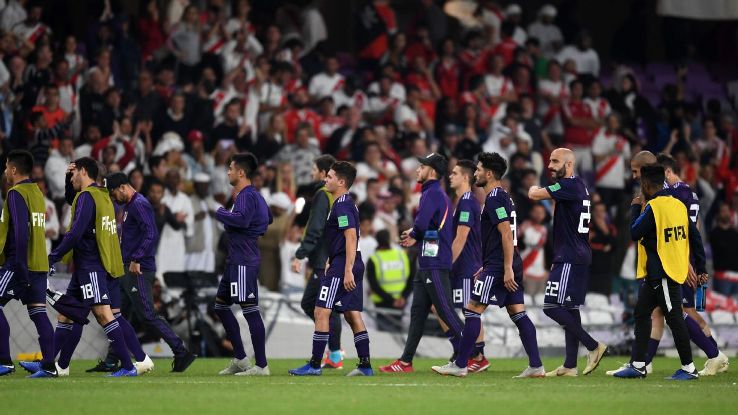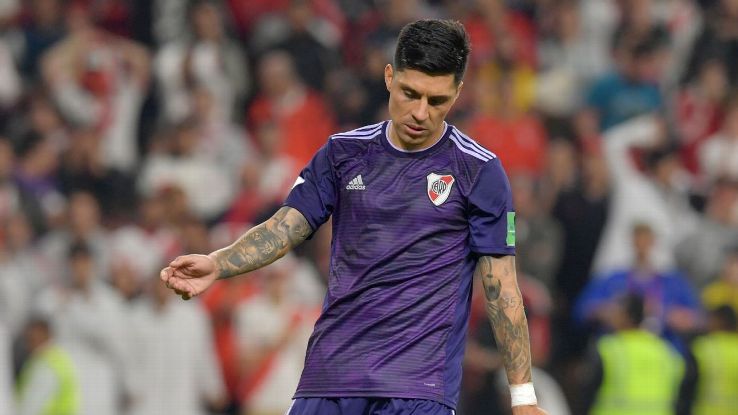
Ever since the current format of the FIFA Club World Cup was introduced in 2005, the semifinal stage has been an exercise in torture for South American champions.
First, there is almost too much at stake. The most powerful force in the competition is the desire of the Libertadores winners to have a crack at the European champions. As recently as two decades ago, this was an entirely fair fight. The sad truth, from the South American perspective, is that these days their representative is no longer vastly superior to the champions of the less traditional continents. And so the semifinal has become an increasingly tricky obstacle for the South American sides to navigate. There have been a series of hard-fought, narrow victories, and, now, four defeats after Argentina’s River Plate fell on penalties to local side Al-Ain in the United Arab Emirates.
And River were even helped by the fact that Al-Ain were slow out of the blocks. In Saturday’s quarterfinal against African champions Esperance Sportive de Tunis, Al-Ain took the lead from a corner from the right after just one minute and nineteen seconds. This time they were forced to wait an until the third minute to get themselves in front in a similar manner.
Midfielder Ahmed Barman curled in the corner left footed, striker Marcos Berg jostled at the near post with centre-back Javier Pinola, the ball went through the legs of goalkeeper Franco Armani and crossed the line. The goal was awarded to Berg, though the final touch may well have come off Pinola. It all added up to the same thing — River Plate had to chase the game.
By the 16-minute mark they had done it so well that they had taken the lead — with plenty of credit to their coach Marcelo Gallardo. A top player in his day, Gallardo is only 42, but has been in charge of River for four years — a marathon spell by contemporary South American standards. He has developed hugely in that time, mastering a wide range of tactical adjustments.
Today’s was all about MLS-bound support striker Gonzalo “Pity” Martinez. In the first game of the Libertadores final he was used in a central role behind the strikers, before reverting back to his usual position wide on the left for the second leg . For this game he was employed wide on the right, where he found space to pick apart the Al-Ain defense.
His partner in crime was Colombian striker Rafael Santos Borre, returning after missing out on the second leg of the Libertadores final through suspension. Gallardo has used him especially well in recent months. Santos Borre’s mobility and capacity to run behind the defensive line have made him the first name on the attacking team sheet. Twice Martinez set up the moves, twice Santos Borre rounded them off, and after going down 1-0, River led 2-1.

But this still left plenty of time for them to defend. Their glaring lack of central defensive pace is, these days, a common South American problem, one that Boca Juniors had highlighted in the Libertadores final. With plenty of speed and trickery, Al-Ain caused problems every time they attacked with conviction — and just after half-time they drew level. Brazilian striker Caio, a headache for River throughout the game, played a neat one-two down the left with Japanese full-back Tsukasa Shiotani before cutting in past centre-back Jonatan Maidana and firing his shot in at the near post.
Gallardo reached for the same solution that had won him the Libertadores — the introduction of Colombian playmaker Juan Fernando Quintero. But Al-Ain had done their homework. They brought on Rayan Yaslam to keep him quiet.
Out of the blue, River won a penalty. Al-Ain right-back Mohamed Ahmed got himself in a tangle and pushed Milton Casco. Up stepped Martinez who fired his shot left footed off the bar. A kind of sporting justice had been served. The penalty was not 100 percent clear — and in the first half Al-Ain had a fair claim for a spot kick for hand ball denied, and an equaliser ruled out by VAR for a debatable offside.
Gallardo shuffled his pack in extra time, and River did most of the pressing. But the outstanding save came at the other end, a swivelling volley from Ahmed forcing a reflex block from Armani. And so to penalties. No one missed — though Armani got his hand to a couple — until Enzo Perez, taking River’s fifth,, went to the keeper’s left and saw Khalid Eisa pull off an athletic save. Al-Ain — who were 3-0 down to Team Wellington of New Zealand in their opening game — are now through to the final.
For River Plate, of course, this is a disaster. It takes much of the gloss from the Libertadores win over Boca Juniors. Local bragging rights remain, but the Buenos Aires Superclassico is now surely diminished in global importance. It becomes increasingly hard to maintain the wall of denial about the declining relative standing of the South American club game.
There is one way that River can regain some pride — hope that Japan’s Kashima Antlers can beat Real Madrid in the second semifinal. That, of course, would set up a third-place clash between River and Real. There may not be a title at stake, but at least the Libertadores winners would be able to have a crack at the Champions League holders. Win that one and River could return home with heads held high — though the defensive unit that could barely cope with Al-Ain would need some rapid improvement in order to deal with the star-studded front line of Los Blancos.
